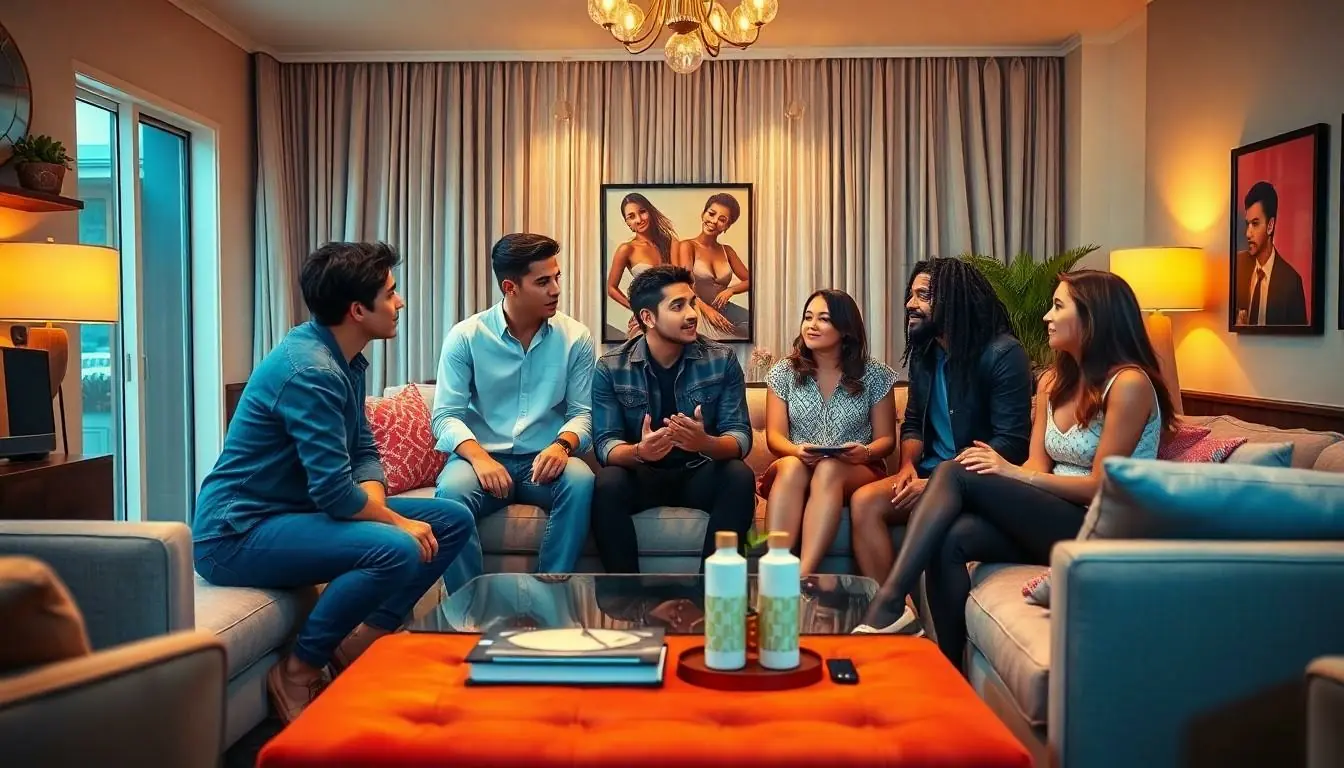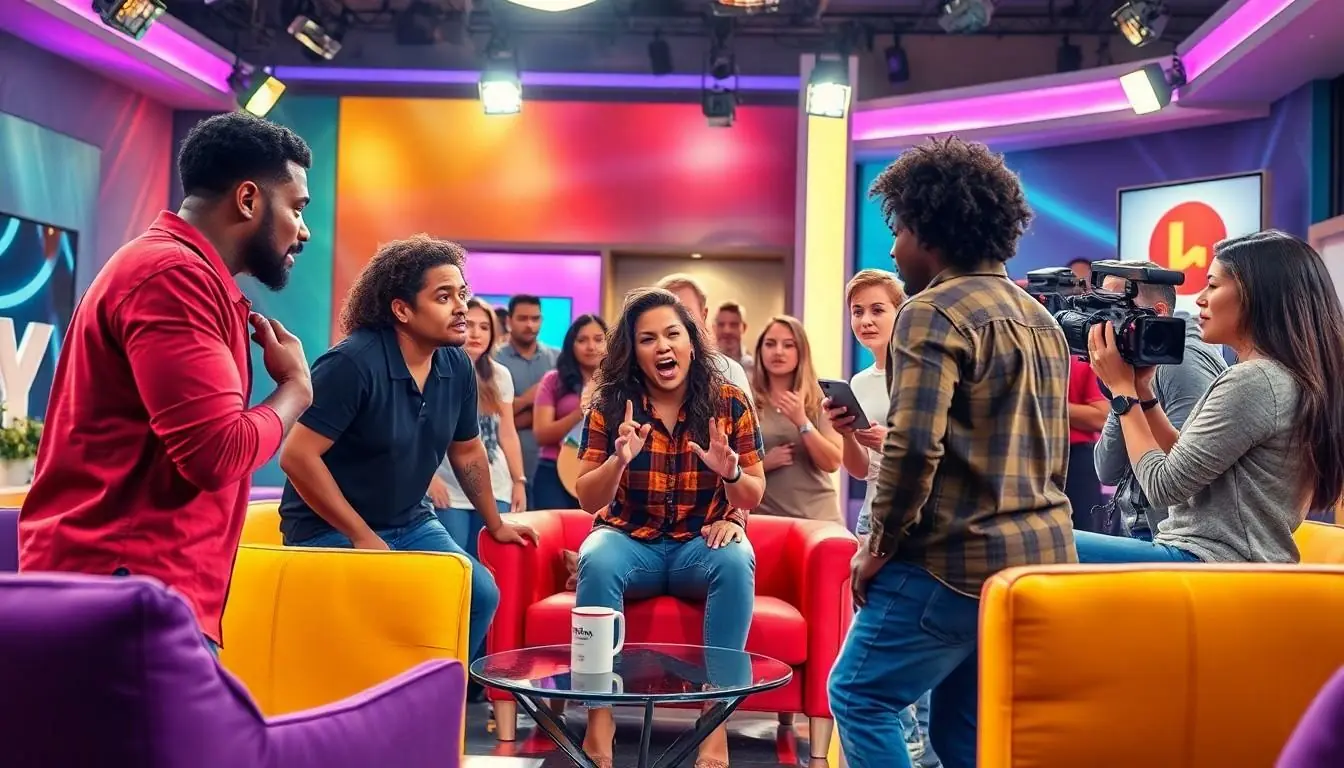Reality TV has taken the world by storm, captivating audiences with its wild drama and outrageous antics. But behind the glitz and glamour, a burning question lingers: is it all just an elaborate script? Viewers often find themselves wondering if those tearful confessions and explosive confrontations are as real as they seem or if they’re just cleverly crafted moments designed to keep audiences glued to their screens.
With producers pulling the strings and editing wizards working their magic, the line between reality and fiction can get blurry. Dive into the fascinating world of reality television, where the truth may be stranger than fiction, or perhaps just a well-timed plot twist. Get ready to uncover the secrets behind the scenes and determine whether reality TV is truly unscripted or just a scripted version of reality.
Table of Contents
ToggleOverview Of Reality TV
Reality TV encompasses a diverse range of programming that features unscripted real-life situations. Genres vary from competition-based shows to lifestyle documentaries, attracting millions of viewers across networks and streaming platforms. Producers often influence events, steering storylines to spark drama or tension.
Viewers encounter familiar formats, like “survival challenges” or “makeover transformations.” While participants experience authentic moments, editing shapes the storyline, crafting narratives that may not reflect actual events. The blend of real-life interaction and creative direction creates compelling content, often leading to debates about authenticity.
Numerous reality shows utilize producer guidance to enhance viewer engagement. Cast members may receive directives during filming, resulting in spontaneous reactions that fuels excitement. This manipulation can blur the line between unscripted experiences and scripted outcomes, challenging perceptions of reality television.
Expectations vary among different shows. Competition series like “Survivor” focus on strategy and alliances, while dating shows like “The Bachelor” emphasize romance and emotional connections. Each format leverages unique elements to captivate audiences, contributing to their popularity.
Analytics show that reality TV often garners higher viewership ratings than scripted programs. As audiences demand more content, networks continuously adapt, blending authentic storytelling with manufactured drama. This trend reinforces the importance of examining how much of reality TV is genuinely unscripted.
The Concept Of Scripted Reality

Reality TV often merges genuine emotions with fabricated scenarios. Producers play vital roles in shaping these narratives, creating a unique blend of scripted moments and authentic reactions.
Differences Between Scripted And Unscripted
Scripted shows instruct actors on lines and actions, ensuring predetermined outcomes. In contrast, unscripted series showcase real individuals navigating genuine experiences, often with little direction. The latter often relies on editing to create compelling story arcs, while scripting provides a detailed framework from which performers operate. Viewers might encounter shared elements across both formats, yet scripted reality typically intensifies drama for entertainment purposes. Audience reactions can variedly reflect perceptions of authenticity, affecting overall engagement.
Examples Of Scripted Reality Shows
Numerous popular programs feature scripted reality elements. One well-known example is “The Hills,” where producers encourage conflicts and relationships among cast members for drama. “Keeping Up with the Kardashians” also exemplifies this trend, with producers crafting storylines around the family’s personal lives. Additionally, “The Real World” builds scenarios designed to evoke specific reactions. Each of these shows strategically intertwines reality with oversight and direction, creating a captivating experience for viewers.
Evidence Supporting Scripted Elements
Numerous insights emphasize the potential scripted elements in reality TV. Producers often manipulate situations to enhance the narrative, crafting situations that maintain viewer engagement.
Behind-The-Scenes Insights
Producers frequently dictate the direction of the storyline. Guidance from production teams influences participant behavior during filming. Various reality shows utilize suggestions and prompts, steering cast members toward specific reactions. Editing further shapes the final product. Raw footage undergoes significant cuts to create coherent narratives that highlight tensions and relationships. Viewers rarely see the unaltered version of events. Creative decisions made during post-production play a crucial role in determining the show’s pacing and tone.
Interviews With Reality TV Participants
Participants often disclose experiences during interviews. Many express awareness of production influences, stating that cast interactions sometimes feel staged. Some contestants reveal that producers suggest scenarios to heighten drama and tension. Authentic emotional responses blend with orchestrated situations, creating compelling narratives. Interviews highlight the tension between genuine experiences and manufactured moments. Numerous former cast members support the idea that editing shapes their portrayal, leading to a final result that may not accurately reflect their views or actions.
Arguments Against Scripted Claims
Many argue that reality TV maintains authenticity despite production involvement. Various moments captured on camera reveal genuine emotional reactions. Participants often describe their experiences as unfiltered and real, suggesting a spontaneous nature to interactions. Producers facilitate scenarios that spark drama, but participants frequently react naturally to these situations.
Authenticity In Reality TV
Reality TV fosters authentic moments, with contestants navigating real-life challenges. Viewers witness true friendships and conflicts that unfold spontaneously. Contestants emphasize their perspectives as genuine, highlighting moments of vulnerability. Many assert that, although producers offer guidance, the essence of their experiences remains relatable. Exploring their relationships often uncovers deeper emotional connections that resonate with the audience.
Viewer Perspectives
Audience members frequently perceive reality TV as unscripted, resonating with its relatability. Fans connect with the raw emotions displayed on screen, believing in the authenticity of participants. Conversations surrounding reality TV often highlight viewer impressions, reinforcing the idea that shared experiences drive engagement. Viewers compare reactions to their own lives, fostering a sense of community around favorite shows. These perspectives demonstrate the multifaceted nature of reality TV, where genuine enjoyment emerges despite production influences.
Reality TV continues to spark intrigue with its blend of authenticity and production influence. While producers craft narratives to enhance drama, participants often experience genuine moments that resonate with viewers. This duality challenges perceptions of what is real and what is scripted, creating a unique viewing experience.
As audiences engage with these shows, they find themselves drawn to the emotional connections and relatable challenges faced by the cast. Despite the manipulation behind the scenes, the essence of reality TV lies in its ability to showcase real-life interactions, prompting viewers to question the nature of reality itself. The ongoing debate about the authenticity of reality television ensures its place as a compelling genre in the entertainment landscape.



